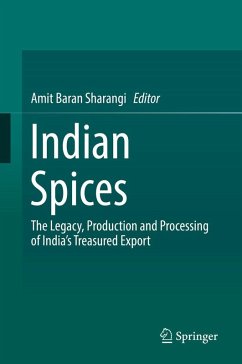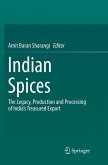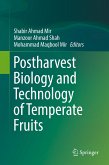This work comprehensively covers the production, processing and post harvest technology of Indian spices with an added focus on the history and uniqueness of this legendary regional product. Individual chapters describe the unique aspects of these spices and their production, post harvest technology and value addition, molecular breeding, organic farming aspects, climate change effects and bioactive compounds. Seasonal, preparatory, and storage conditions resulting in composition variations are explored.
Indian Spices: The Legacy, Production and Processing of India's Treasured Export begins by outlining the historical legacy of Indian spices and describing the many aspects that make this product so unique and highly valued. The abundance and variety of these spices are also delineated. Further chapters focus on current research involving the production technology involved in production, management, harvesting and processing of Indian spices along with post harvest processes, storage and transportation. Important and effective trends such as molecular breeding for spice crop improvement, tissue culture, climate change impacts, organic spices, extension strategies and secondary metabolites receive dedicated chapters. A valuable aspect of this work is the presentation of value chains for these spices, with extensive research presented on the marketing and export of the product. With the shift from localized distribution networks to a fully globalized industry, this book comes at an important time of growth for Indian spices and will be of major value to any researcher with interest in the past, present and future of this product.
Indian Spices: The Legacy, Production and Processing of India's Treasured Export begins by outlining the historical legacy of Indian spices and describing the many aspects that make this product so unique and highly valued. The abundance and variety of these spices are also delineated. Further chapters focus on current research involving the production technology involved in production, management, harvesting and processing of Indian spices along with post harvest processes, storage and transportation. Important and effective trends such as molecular breeding for spice crop improvement, tissue culture, climate change impacts, organic spices, extension strategies and secondary metabolites receive dedicated chapters. A valuable aspect of this work is the presentation of value chains for these spices, with extensive research presented on the marketing and export of the product. With the shift from localized distribution networks to a fully globalized industry, this book comes at an important time of growth for Indian spices and will be of major value to any researcher with interest in the past, present and future of this product.








